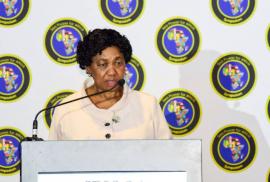
Defence and Military Veterans Minister, Angie Motshekga, has urged Africa to safeguard its coastlines from human trafficking, drug trafficking and illegal fishing, and prioritise maritime safety.
“...For safety purposes, [we must] make sure [we] protect [our] coastlines... We have to prioritise safety,” the Minister said at the 5th Seapower for Africa Symposium, which was held in Cape Town this week.
Hosted by the South African Navy, the two-day conference brought together naval leaders, defence experts, policymakers and industry stakeholders from Africa and beyond.
The symposium, which concluded on Wednesday, was an opportunity for invited African countries to consolidate their naval capabilities to gain firsthand insights into strategies for safeguarding Africa’s maritime interests.
These include the blue economy, maritime security, ocean health and blue justice (a critical approach towards examining how coastal communities and small-scale fisheries are affected by blue economy initiatives undertaken by institutions and governments globally to promote sustainable ocean development).
The Seapower for Africa Symposium is also a platform to find African solutions for African problems.
“The Sea Power for Africa Symposium 2024 is currently the only rendezvous on the African continent that brings together senior maritime and navy minds, with a strategic blend of maritime academia that interrogates maritime threats and challenges for the entire continent,” the Minister said.
According to Motshekga, South Africa is a maritime nation endowed with a double geo-political identity – the land and the sea.
“From the land side, our country is seen as one of the gateways into the African continent. Our country is also situated along a strategic maritime trade chokepoint along the African coast. This double blessing shapes to a large degree our maritime and naval interest as a nation.”
Situated along vital sea routes of the world, the South Atlantic, Indian and Southern oceans, South Africa has a coastline of more than 3 900km, along which its maritime resources are spread, ranging from the Orange River in the west to Ponta do Ouro in the east.
“However, South Africa is but one of 38 coastal States in Africa. Many of the maritime security challenges experienced by our country are echoed by these countries as well. The other 16 land-locked African countries are also dependent on their trade with those fellow African countries endowed with access to the world’s trade routes.
“The geo-strategic position of the African continent in world trade is concentrated in three chokepoints along our continent... Should these three chokepoints all experience challenges simultaneously, most of the world trade will come to a grinding halt,” Motshekga explained.
The Minister stressed that all coastal States have a responsibility to monitor and protect their maritime zones, marine resources, marine ecology and conservation, as well as their maritime trade.
“All of these factors carry with them immediate national, regional and international obligations.”
Motshekga said the geo-strategic position of the African continent, along with the interconnectivity of the African maritime domain, has made cooperation and information sharing within the African continent and the world “non-negotiable”.
“Current-day maritime threats require an integrated approach, which is the cornerstone of the African Integrated Maritime Security Strategy 2063,” the Minister said. – SAnews.gov.za


